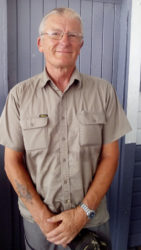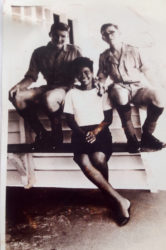Fifty years after being witness to the auspicious moment when the Union Jack was lowered and replaced with the Golden Arrowhead, British soldier Edward John Constant returned to Guyana to join in the celebration of the country’s independence anniversary.
Constant had been 19 years old when he travelled to Guyana in 1966, and had served from March to October that year in the Middlesex Regiment.
In a letter to British High Commissioner Greg Quinn, Constant wrote that he had promised himself, “God willing,” that he would return. “My intentions were to wear my blazer and medal on the parade ground on the 26th May as I did 50 years ago,” he stated.

So on the evening of May 25, he donned his blazer and medals and marched, on his own, 15 minutes from his hotel to D’Urban Park, where the flag would be raised at midnight. He chose to stand on the tarmac, owing to the heat in the stands.

The medals he wore attracted attention, however, and soon enough, he found himself being interviewed and photographed, first by a local reporter, then an American one. Realising he was being “bombarded by the press,” he slipped away, but was later approached by a man, dressed in black, who, after verifying that he was Edward John Constant, asked if he would follow him.
Constant related that he at first said no to the request, having had reservations. The man, however, who he later learned was one of the President’s bodyguards, informed him that he was being invited to have a seat in the Presidential Box. There, he met the daughter of Forbes Burnham, Prime Minister at the time Guyana was led to Independence, with whom he had brief conversation.
There is not much that stands out to Constant about the independence event 50 years ago, except for later that day when his battalion was placed on standby to protect the presidential homes and embassies, owing to unrest that had developed.
Asked how he felt the city has changed since then, he quickly replied, “Safer,” then explained that 50 years prior, they had had to go out in groups of twos and threes as they were not allowed to walk alone.




